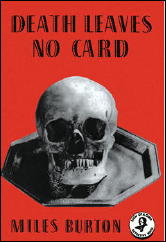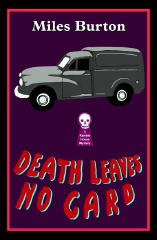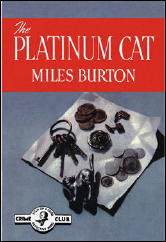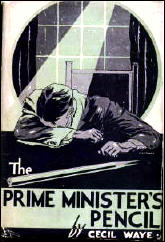Fri 14 Sep 2012
ELSEWHERE ON THE WEB, by Mike Tooney: MILES BURTON – Death Leaves No Card.
Posted by Steve under Reviews[2] Comments
MILES BURTON – Death Leaves No Card. Collins, UK, hardcover, 1939. First US edition: Ramble House, 2012.

“If it was a case of murder, it was a case with remarkably few clues. When members of the Maplewood family and their servants broke down the bathroom door, they found the body of Basil Maplewood, who apparently died while getting into his bath. Certainly there was nobody else in the locked bathroom. And yet there was no indication at all of how the young man might have died. Even the post-mortem didn’t come up with a likely cause of death. You’d have to say, really, that in this case, Death Leaves No Card. Which is the title of the Golden Age mystery by Miles Burton, which is the subject of today’s audio review on the ‘Classic Mysteries’ podcast.”
— Les Blatt, ‘Classic Mysteries’
http://www.classicmysteries.net/2012/09/death-leaves-no-card.html
See also:
“For the first time since his fully-fledged debut in The Menace on the Downs, Inspector Arnold of the Criminal Investigation Department goes it alone in attempting to solve the death of a man discovered alone in a locked bathroom. The cause of death baffles the police and although there are suggestions that something like electric shock may be to blame no possible source can be discovered. Suspicion quickly falls on the dead man’s uncle, and he clearly has a motive, but opportunity and means seem to be non-existent and the mystery begins to look insoluble.”
— R. E. Faust, GAD Wiki
http://gadetection.pbworks.com/w/page/79303/Death%20Leaves%20No%20Card

“Plot wise, this book is still a fairly competent entry into the locked room sub-genre, but the ho-hum storytelling also makes it a decidedly unexciting one — and not a book that you’ll likely finish in one sitting.”
— Patrick, “Beneath the Stains of Time”
http://moonlight-detective.blogspot.com/2011/07/death-cant-be-locked-out.html
“Death Leaves No Card (1939) is an excursion by the author into the Impossible Crime, one of around eight novels he wrote in this subgenre. It’s a mild and ultimately fairly minor book. … The explanation of the impossible crime is sound enough, but none too creative.”
— Mike Grost, “A Guide to Mystery and Detection”
http://mikegrost.com/rhode.htm#Card
http://gadetection.pbworks.com/w/page/7931418/Rhode%2C%20John
Other Burton reviews:
From The Saturday Review, September 24, 1938, “The Criminal Record” —

“Title and Author: THE PLATINUM CAT – Miles Burton (Crime Club: $2.00)
“Crime, Place, Sleuth: Calcined corpse in English cottage identified as possessor of valuable War secrets. Miles Burton and War office independently seek killer.
“Summing Up: Interesting spectacle of several clever investigators reaching same conclusions by different methods, plus better than average international spy yarn.
“Verdict: Able.”
http://www.unz.org/Pub/SaturdayRev-1938sep24-00018a02
From The Saturday Review, February 2, 1946, “The Criminal Record” —
“Title and Author: ACCIDENTS DO HAPPEN – Miles Burton (Crime Club: $2.00)
“Crime, Place, and Sleuth: Violent deaths decimate English country family. Desmond Merrion is on scene but confession solves all.
“Summing Up: Enough casualties to suit most gory-minded reader. Interesting background and characters. Assorted sleuths all baffled.
“Verdict: Sanguinarily boring.”
http://www.unz.org/Pub/SaturdayRev-1946feb02-00028
Street writing as “Cecil Waye” —

“John Street — former intelligence officer, practitioner of politico-military propaganda and well known to readers of crime and detective stories as “John Rhode” and “Miles Burton” — was ‘not an easy man to know — his reticences were such that all who met him could not fail to respect them, but to those who were privileged to enjoy his friendship he leaves memories of kindnesses and sensitive understanding that might surprise many of his readers.’
“Something that came as a surprise for almost all of Street’s many readers when this article first appeared is that he also wrote mysteries under another, previously unsuspected pseudonym. A pseudonym that, like ‘John Rhode,’ plays on his real name. John Street was also ‘Cecil Waye,’ author of a series of four novels published in the early 1930s.”
— Tony Medawar, “A ‘Rhode’ by Any Other Name”
https://mysteryfile.com/Rhode-Waye/Medawar.html
September 14th, 2012 at 6:38 pm
Even though this is a Locked Room mystery, it seems to have gotten a mixed set of reviews at best. It’s certainly good news, though, to see that Ramble House has reprinted it, so if you care to, you can check it out for yourself.
I have a long wish list of titles I could choose from Ramble House’s only slightly longer list of offerings, but every time it gets to be this time of the month, I check my credit card account and I say to myself, maybe next month.
September 15th, 2012 at 12:20 pm
Speaking of Ramble House, I read somewhere that they finally released the new edition of The Smiling Corpse by Philip Wylie and his colleague with my introduction. So far they haven’t sent me a copy so I ought to get in touch with them.